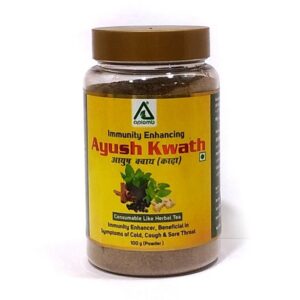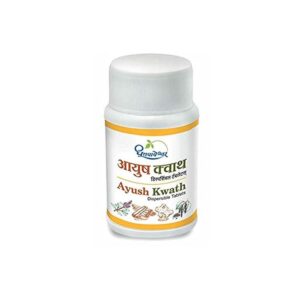TULSI (OCIMUM SANCTUM) + DALCHINI (CINNAMOMUM ZEYLANICUM) + SUNTHI (ZINGIBER OFFICINALE) + KALIMIRCH (PIPER NIGRUM)
Tulsi (ocimum Sanctum): Tulsi, also known as Ocimum sanctum or holy basil, is a medicinal herb commonly used in Ayurvedic medicine. It has been traditionally used for its adaptogenic, immunomodulatory, and anti-inflammatory properties.
Tulsi is primarily used to promote overall health and well-being. It is known to support the body’s natural response to stress, boost the immune system, and improve cognitive function. It is also used for its antioxidant properties and to relieve cough and cold symptoms.
The exact mechanism of action of tulsi is not fully understood. However, it is believed to work through various mechanisms including modulating the release of stress hormones, reducing inflammation, and enhancing the activity of antioxidants in the body.
Tulsi is available in various forms such as dried leaves, extracts, capsules, and teas. The dosage can vary depending on the form and the specific product. It is recommended to follow the instructions provided on the product label or consult a healthcare professional for the appropriate dose.
Tulsi is generally considered safe for most people when taken in recommended doses. However, like any herbal supplement, it may cause some side effects in certain individuals. Common side effects may include mild gastrointestinal discomfort such as stomach upset, nausea, or diarrhea. It may also cause an allergic reaction in some sensitive individuals. It is advisable to discontinue use and consult a healthcare professional if any adverse reactions occur.
It is important to note that Tulsi may interact with certain medications, including blood-thinning medications, antidiabetic drugs, and drugs that suppress the immune system. Therefore, it is recommended to consult with a healthcare professional before starting tulsi or any other herbal supplement, especially if you have any pre-existing medical conditions or are taking other medications.
Dalchini (cinnamomum Zeylanicum): Dalchini, also known as Cinnamomum zeylanicum or Ceylon cinnamon, is a medicinal plant used as a spice in cooking. It has various health benefits and therapeutic uses.
Dalchini is primarily used for its anti-inflammatory, antioxidant, and antimicrobial properties. It contains active compounds such as cinnamaldehyde, eugenol, and cinnamyl alcohol, which contribute to its medicinal effects.
One of the key uses of Dalchini is in managing blood sugar levels in people with diabetes. It can help improve insulin sensitivity and regulate blood glucose levels. It may also have a cholesterol-lowering effect, which can be beneficial for heart health.
The dosage of Dalchini can vary depending on the form of consumption. As a spice, a pinch or two can be added to food or beverages. As a supplement, capsules or tablets containing Dalchini extract are available, and the recommended dosage should be followed as per the manufacturer’s instructions.
Although Dalchini is generally safe for consumption, some individuals may experience side effects. These can include allergic reactions, mouth irritation, and gastrointestinal issues such as stomach upset, diarrhea, or nausea. It is important to consult with a healthcare professional before using Dalchini, especially if you have any pre-existing medical conditions or are taking other medications.
It is worth noting that Dalchini may interact with certain medications, including anticoagulants, antiplatelet drugs, and diabetes medications. It is essential to inform your healthcare provider about any ongoing treatment before incorporating Dalchini into your routine. Pregnant or breastfeeding women should also exercise caution and consult a healthcare professional before using Dalchini.
Sunthi (zingiber Officinale): Sunthi, also known as Zingiber officinale or ginger, is a commonly used herbal medication derived from the root of the ginger plant. It has been used for centuries in traditional medicine for its various therapeutic properties.
Use:
Sunthi is primarily used to treat gastrointestinal disturbances such as nausea, vomiting, and indigestion. It is often recommended for morning sickness during pregnancy and motion sickness. It is also used to alleviate symptoms associated with common colds, cough, and sore throat. Additionally, sunthi is known for its anti-inflammatory and antioxidant effects, making it useful in relieving pain and inflammation in conditions like osteoarthritis.
Mechanism of Action:
The active compounds in sunthi, including gingerol and shogaol, exert their effects on the body through various mechanisms. Sunthi has antiemetic properties, meaning it reduces nausea and vomiting, by acting on receptors in the gastrointestinal tract, stomach, and central nervous system. It also has anti-inflammatory effects by inhibiting certain enzymes involved in the inflammatory response, thus reducing pain and swelling.
Dose:
The appropriate dose of sunthi may vary depending on the condition being treated. However, the general recommended dose for adults is 250-500 mg of sunthi extract, taken up to 4 times daily. For nausea and vomiting during pregnancy, a typical dose is 1 gram of sunthi powder per day, divided into multiple doses. It is advisable to follow the instructions on the product label or consult a healthcare professional for proper dosage guidance.
Side Effects:
Sunthi is generally considered safe when consumed in appropriate amounts, and adverse effects are rare. However, some individuals may experience mild side effects such as heartburn, gastrointestinal discomfort, or allergic reactions like skin rash. High doses may occasionally cause irritation or inflammation of the stomach lining. It is important to note that consuming excessive amounts of sunthi may interfere with blood clotting, so caution must be exercised in individuals on anticoagulant medications or those with bleeding disorders.
As with any medication, it is advisable to consult with a healthcare professional, particularly for individuals with pre-existing medical conditions or those taking other medications, to ensure sunthi is safe and appropriate for use.
Kalimirch (piper Nigrum): Kalimirch, scientifically known as Piper nigrum, is a commonly used herb in Ayurvedic medicine. It is also known as black pepper. While it is primarily used as a spice in cooking, it also possesses medicinal properties.
Kalimirch is used to aid digestion, promote weight loss, improve respiratory health, and boost the immune system. It is also used as an analgesic and to alleviate symptoms of cough and cold.
The mechanism of action of Kalimirch is mainly attributed to the compound piperine, which is found in high concentrations in black pepper. Piperine has been found to have multiple effects on the body, including:
1. Digestive aid: Piperine stimulates the secretion of digestive enzymes, promoting proper digestion and preventing digestive disturbances.
2. Weight loss: Piperine has been found to increase metabolism and enhance thermogenesis, leading to increased calorie burning and potential weight loss.
3. Respiratory health: Kalimirch is known for its expectorant properties, helping to relieve congestion and promote respiratory comfort.
4. Immune-boosting: Piperine has been shown to stimulate the immune system by promoting the activity of natural killer cells and enhancing the production of cytokines.
The recommended dose of Kalimirch varies depending on the intended use and form of administration. As a spice, it is typically added to food in moderate amounts. In Ayurvedic medicine, it can be consumed as an herbal powder or in the form of capsules.
While Kalimirch is generally safe for consumption, excessive consumption or high doses may lead to side effects such as gastrointestinal irritation, heartburn, or allergic reactions in some individuals. It is advisable to start with small amounts and gradually increase the dosage to assess tolerance.
Before using Kalimirch for medicinal purposes, it is recommended to consult with a healthcare professional or an Ayurvedic practitioner, who can provide personalized advice based on individual health conditions and potential drug interactions.



